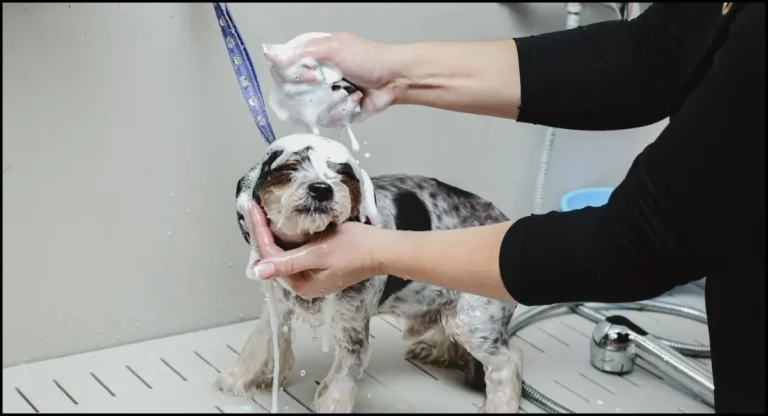How Long Are Dogs Pregnant For?

How Long Are Dogs Pregnant For? To know it read the full article.
This article will provide you a detailed information about duration of a dog’s pregnancy, or gestation period and all you need to know.
Understanding Dog Gestation
A typical dog pregnancy lasts about 63 days (9 weeks), but this can vary. It’s important to note that this duration can be influenced by factors such as breed, size of the dog, health, and the number of puppies.
How Long Are Dogs Pregnant For?

Here is a table outlining the gestation periods and the common expected number of puppies per litter for various dog breeds: You will be able to know how long for dog pregnancy.
Puppy Gestation Period
| Breed | Gestation Period (Days) | Expected Puppies Per Litter |
|---|---|---|
| Labrador Retriever | 63 | 6-8 |
| German Shepherd | 63 | 5-10 |
| Beagle | 63 | 6-8 |
| Bulldog | 63 | 3-4 |
| Poodle | 63 | 5-7 |
| Siberian Husky | 63 | 4-6 |
| Golden Retriever | 63 | 8-10 |
| Boxer | 63 | 6-8 |
| Dachshund | 63 | 4-6 |
| Rottweiler | 63 | 8-12 |
| Pomeranian | 63 | 1-3 |
| Shih Tzu | 63 | 2-5 |
| Chihuahua | 63 | 2-5 |
| Border Collie | 63 | 6-8 |
| French Bulldog | 63 | 3-5 |
What is the best thing to feed a pregnant dog?
| Food | Daily Recommended Amount | Benefits |
|---|---|---|
| High-quality Puppy Food | According to dog size and breed | Higher in calories and nutrients to support growth of puppies |
| Lean Meat | 10-20% of diet | Provides high-quality protein for muscle development |
| Eggs | 1-2 per day | Rich in protein and essential fatty acids |
| Cottage Cheese | Small portion | High in calcium, supports bone development |
| Fish Oil | As per vet’s recommendation | Provides omega-3 fatty acids for brain development |
| Fruits and Vegetables | Small portion | Provides vitamins and antioxidants, supports immune system |
This table offers a guide to feeding a pregnant dog. It’s important to tailor the diet to the specific needs of the dog, considering her size, breed, health status, and the stage of pregnancy.
Prenatal Care and Potential Complications in Dog Pregnancy
Understanding the timeline for prenatal care is crucial for ensuring the health and well-being of both the mother and her developing puppies.
Timeline for Prenatal Care
Early Stage (Weeks 1-3)
- Veterinary Check-up: As soon as you suspect your dog is pregnant, it’s advisable to schedule a veterinary examination to confirm the pregnancy and discuss a prenatal care plan.
- Nutrition: Focus on high-quality, balanced nutrition. Your vet may recommend a gradual shift to a diet formulated for pregnant dogs.
Mid Stage (Weeks 4-6)
- Diet Adjustment: Increase food intake gradually as the fetuses grow, following your vet’s guidance.
- Exercise: Maintain regular, gentle exercise to keep the dog healthy without causing stress.
Late Stage (Weeks 7-9)
- Preparing for Birth: Prepare a comfortable whelping area. Reduce exercise as the due date approaches.
- Monitoring: Watch for signs of impending labor, such as nesting behavior and restlessness.
Nutritional Imbalances
Improper nutrition can lead to complications like eclampsia or developmental issues in puppies. Follow a vet-approved diet.
Miscarriage and Stillbirths
These can occur due to various factors including infections, hormonal imbalances, or physical issues.
Dystocia (Difficult Labor)
Some breeds are prone to birthing difficulties. Be aware of how long normal labor should take and when to call the vet.
Infections
Canine herpesvirus is a concern for pregnant dogs. Ensure vaccinations are up to date, and maintain a hygienic environment.
Managing Complications
- Regular Veterinary Visits: Schedule regular check-ups throughout the pregnancy to monitor the health of the mother and puppies.
- Emergency Plan: Have a plan in place for veterinary emergencies, especially as the due date nears.
- Observation: Keep a close eye on the mother for any signs of distress or illness.
Preparing for Whelping
Preparing for whelping, which is the process of a dog giving birth, is a crucial phase in the canine gestation period. Proper preparation ensures a safe and comfortable environment for the mother and her newborn puppies. Here’s a detailed guide on how to prepare for whelping:
- Understanding the Timeline: Dogs are typically pregnant for about 63 days (9 weeks). As the due date approaches, it’s important to know the signs of labor. These can include a drop in body temperature 24 hours before birth, restlessness, nesting behavior, loss of appetite, and visible contractions.
- Veterinary Consultation: Have a final check-up with a veterinarian as the due date approaches. This check-up can confirm the number of expected puppies and ensure the mother is healthy and ready for the birthing process.
- Setting Up a Whelping Area:
- Select a Quiet Location: Choose a quiet and comfortable area in your home, away from heavy foot traffic, to set up the whelping box.
- Whelping Box: The whelping box should be large enough for the mother to move around comfortably but with sides high enough to safely contain the puppies. Line the box with soft, absorbent, and easily replaceable bedding, like newspapers or towels.
- Accessibility: Ensure the area is easily accessible for you to assist if necessary, but also private enough for the mother to feel secure.
- Gathering Supplies:
- Medical Supplies: Have on hand a thermometer for monitoring the mother’s temperature, clean scissors for cutting umbilical cords, iodine for disinfecting, and a suction bulb to clear fluids from the puppies’ airways.
- Comfort Supplies: Prepare soft towels or blankets to clean and dry the puppies and keep them warm.
- Feeding Supplies: In case the mother is unable to feed the puppies, have puppy formula, a bottle, and a feeding tube ready.
- Monitoring for Labor: As the due date arrives, monitor the mother closely for signs of labor. Normal labor can last from several hours to a whole day. Puppies are usually born every 30-60 minutes, with 10-30 minutes of active straining.
- Knowing When to Intervene: While many dogs deliver without assistance, it’s crucial to know when to intervene or call a vet. Prolonged labor, distress, or more than two hours between puppies can be signs of complications.
- Post-Birth Care:
- Mother’s Health: After all the puppies are born, ensure the mother is comfortable and healthy. She should be calm and attentive to her puppies.
- Puppy Care: Check that each puppy is nursing properly and staying warm. It’s normal for the mother to spend most of her time with them in the first few days.
- Veterinary Follow-Up: Schedule a post-birth check-up for the mother and puppies to ensure everyone is healthy and thriving.
Preparing for whelping requires attention to detail, patience, and readiness to respond to the mother’s and puppies’ needs. Always keep your veterinarian’s contact information handy and don’t hesitate to seek professional help if you suspect any complications.
Conclusion
Knowing How Long Are Dogs Pregnant For is fundamental for the health and well-being of both the mother and her puppies. For pet owners and breeders, this knowledge is crucial for providing the right care.
For veterinary professionals, it is essential for offering accurate advice and support. And for those simply curious, it provides an interesting glimpse into the world of canine reproduction.
Regardless of the reason for interest, the gestation period of a dog is a key aspect of canine health and care.
Related Posts:
Read More: Why Does My Dog Open His Mouth When I Pet Him? 7 Reasons
Read More: Why Does My Dog Keep Sniffing My Legs: 5 Common Reasons
Read More: Why Does My Dog Bite Me In The Morning? 2 Way To safe From
Read More: Why Are My Dogs Balls Black? Best Number 1 Answer
Read More: Why Do Dogs Like Peanut Butter?
Read More: Dogs Eyes Rolling Back: What Does It Mean & Should You Fret?
Read More: 7 Best Dog Bed for Burrowers Reviews In 2024
Read More: 7 Best Dog Beds under $100 In 2024





